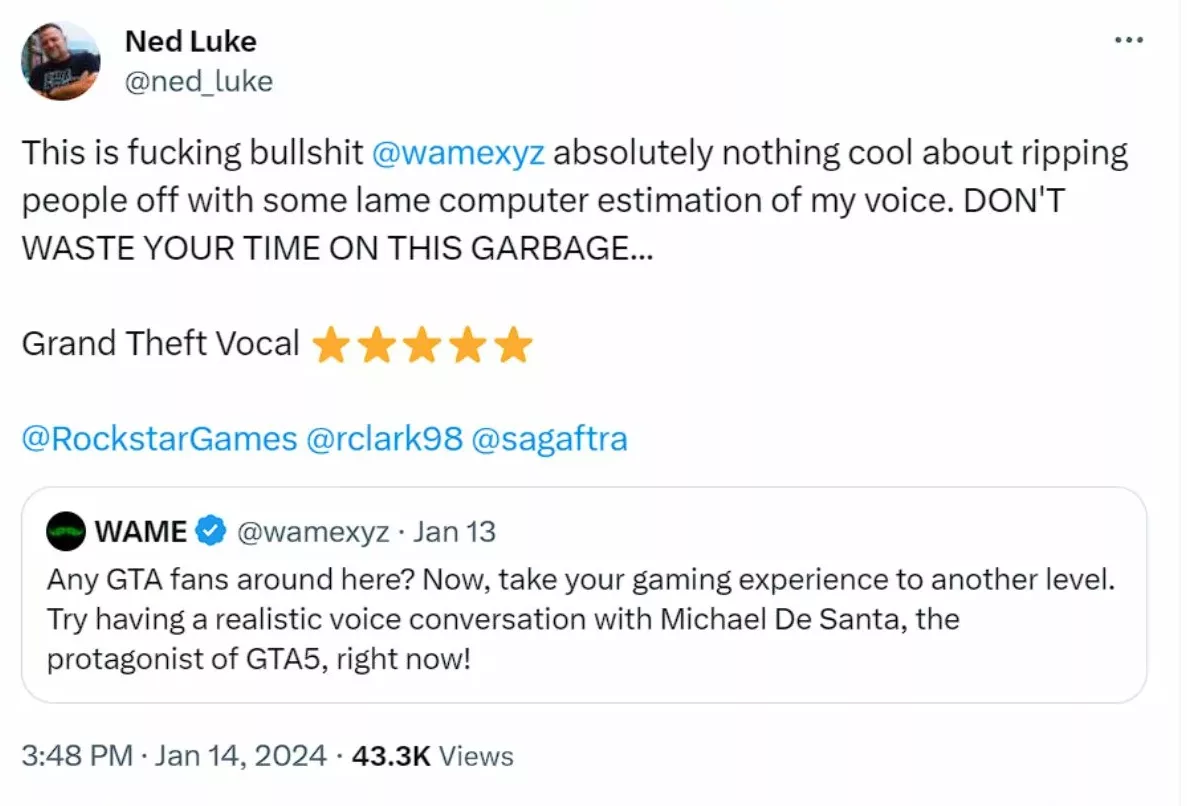In the ever-evolving landscape of artificial intelligence and gaming, a recent incident involving Ned Luke, the voice actor behind the iconic character Michael De Santa in “Grand Theft Auto 5” (GTA 5), has sparked significant controversy.
Luke publicly criticized WAME, a company known for its advancements in AI technology, for creating an AI chatbot that mimicked his voice without his consent. This move by WAME has raised important questions about the ethical boundaries and legalities surrounding AI technology and intellectual property rights in the digital age.
WAME’s chatbot, designed to replicate Luke’s character from GTA 5, drew immediate backlash from the actor. In a strongly-worded statement on social media, Luke condemned the unauthorized use of his voice, labeling the chatbot as a “lame computer estimation” of his vocal identity and calling it “garbage.”
His public outcry led to the swift removal of the chatbot and all promotional material associated with it from the internet. This response by WAME illustrates the growing concerns over the use of AI to replicate human attributes, particularly in the absence of explicit permission from the individuals being imitated.
Rockstar Games and the AI Mod Precedent
The controversy surrounding the WAME chatbot is not an isolated incident in the world of GTA 5. Previously, Rockstar Games, the developer of GTA 5, had to intervene to shut down an AI mod that allowed players to interact with non-player characters (NPCs) using their real voices.
The mod was taken down following a DMCA takedown notice issued by Take-Two, Rockstar’s parent company. These instances underscore the ongoing tension between the innovative use of AI in gaming and the imperative to protect the rights of creators and actors.
This situation has also reignited the debate over the use of AI to replicate the voices of actors in video games. The Screen Actors Guild‐American Federation of Television and Radio Artists (SAG-AFTRA) recently faced backlash for its agreement allowing the use of AI voices by developers, an arrangement that many voice actors claim they were not consulted about.
SAG-AFTRA has since clarified that its deal, which currently applies only to Replica Studios, is aimed at ensuring the ethical use of these technologies, requiring informed consent for the use of members’ voices.
WAME’s Response and Commitment to Ethical Practices
In response to the controversy, WAME issued a statement expressing their understanding and concern over the incident. Acknowledging the complex interplay between AI advancement and legal-ethical considerations, WAME emphasized its commitment to protecting the rights of voice actors and advancing responsible AI practices. The removal of the chatbot following Luke’s reaction reflects WAME’s acknowledgment of its oversight and its dedication to responsible AI development.
The Ned Luke-WAME controversy highlights the delicate balance between technological innovation and ethical responsibility in the digital era. As AI continues to push the boundaries of what’s possible in gaming and other creative industries, the need for clear legal guidelines and ethical practices becomes increasingly paramount.
This incident serves as a crucial moment for introspection and dialogue among technology developers, legal experts, creatives, and the public on how to harmonize AI advancements with the rights and dignity of individuals.















































